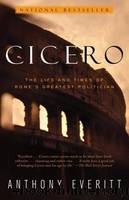Cicero: The Life and Times of Rome's Greatest Politician by Everitt Anthony

Author:Everitt, Anthony [Everitt, Anthony]
Language: eng
Format: epub
Tags: History, Biography, Politics, Philosophy, Classics
ISBN: 9781588360342
Amazon: 1588360342
Goodreads: 13534113
Publisher: Random House
Published: 2001-01-01T08:00:00+00:00
8
THE IDEAL CONSTITUTION
Writing about Politics: 55â43 BC
Now that he was no longer able to play an active role in the conduct of affairs, Cicero decided to find time for another kind of political intervention. It took the form of extended critiques of the crisis facing the Republic, in which he offered his own proposals for reform. By writing books, he believed he could still influence the course of events. If he could no longer promote his cure-all for the Republicâs ills, the âharmony of the classes,â in the Senate House and the Forum, then he would do so from the study.
Nothing like the modern publishing industry existed in ancient Rome, of course, nor were there public libraries, until Caesar founded the first one in the 40s. Books were written out by hand on papyrus rolls (sometimes as long as thirty feet), which were then passed around to friends and acquaintances and stored on shelves. The task of copying was usually given to highly trained slaves. Atticus employed a large number and seems to have acted as a prototypical publisher, probably selling books for a profit. He had many of Ciceroâs speeches and books copied and distributed.
Readers had to work hard. Characters took one form only, without differentiation into capital and lowercase letters. There were no spaces between words or punctuation, and texts were unparagraphed.
Like many Romans, Cicero was a great collector of books. He was proud to acquire rare editions and enjoyed visiting other peopleâs libraries. Despite the technical production difficulties, upper-class Romans were eager to buy the latest works of contemporary writers, which were carefully studied and much discussed. Political pamphlets were an accepted part of public life. Although copying runs must have been small, books appear to have been in plentiful supply. (According to Catullus, they could end up wrapping mackerel in fish shops.)
Ciceroâs literary career was checkered. The precocious teenage poet had grown into an overprolific windbag with his endless autobiographical epic. It was as an orator that he really made his reputation as a writer. He understood that a speech was a one-time, live event like an actorâs performance and that, in the public eye, he would be only as good as his latest appearance. So, like other successful public speakers of his day, he took great pains to work up his speeches on paper and publish them as books. In this way, past rhetorical triumphs became permanent records of achievement.
But he had long been acknowledged as a leader, if not the leader, in this field and he sought a new, more demanding challenge. His first step was to set out his views on political education. This he did in The Ideal Orator (De oratore), a substantial work which he first mentioned to Atticus in November 55. What Cicero had in mind was a justification of rhetoric not as a technique but as an approach to the morally good life, a means of expressing and enforcing morality. Ever since his student days when he toured Greece
Download
This site does not store any files on its server. We only index and link to content provided by other sites. Please contact the content providers to delete copyright contents if any and email us, we'll remove relevant links or contents immediately.
| France | Germany |
| Great Britain | Greece |
| Italy | Rome |
| Russia | Spain & Portugal |
Fanny Burney by Claire Harman(26597)
Empire of the Sikhs by Patwant Singh(23074)
Out of India by Michael Foss(16849)
Leonardo da Vinci by Walter Isaacson(13318)
Small Great Things by Jodi Picoult(7122)
The Six Wives Of Henry VIII (WOMEN IN HISTORY) by Fraser Antonia(5501)
The Wind in My Hair by Masih Alinejad(5092)
A Higher Loyalty: Truth, Lies, and Leadership by James Comey(4954)
The Crown by Robert Lacey(4807)
The Lonely City by Olivia Laing(4798)
Millionaire: The Philanderer, Gambler, and Duelist Who Invented Modern Finance by Janet Gleeson(4468)
The Iron Duke by The Iron Duke(4349)
Papillon (English) by Henri Charrière(4263)
Sticky Fingers by Joe Hagan(4188)
Joan of Arc by Mary Gordon(4101)
Alive: The Story of the Andes Survivors by Piers Paul Read(4021)
Stalin by Stephen Kotkin(3957)
Aleister Crowley: The Biography by Tobias Churton(3634)
Ants Among Elephants by Sujatha Gidla(3463)
